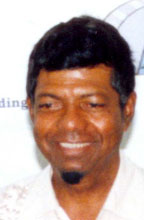A recent report produced by the International Trade Union Confederation (ITUC), which stated that there is an “alarming degree of prostitution” in local secondary schools, has come in for sharp criticism from Education Minister Shaikh Baksh, who says that the report is “anecdotal “ and that its findings are not based on proper scientific research.

The report, which was issued last month, stated that “several studies identified child prostitution as one of the worst forms of child labour in Guyana. For example a 1996 UNICEF survey answered by pupils revealed that 26% and 17% of the respondents knew female and male students respectively who accepted returns in exchange for sexual favours. The study concluded that there is an alarming degree of prostitution within the Guyanese secondary school system.”
Speaking with Stabroek News last week, Baksh said that the findings by the ITUC contradicted those of his Ministry. According to him, his Ministry had conducted surveys in Regions 2, 3, 4,5,6,7 and 10 and he said that only three cases of prostitution in these schools were identified.
He said that two cases of prostitution were found in Region Seven (Cuyuni-Mazaruni). One case was discovered between2007-2008 and another case in 2008-2009. The other case was discovered in Region Six (East Berbice Corentyne) during the period 2008-2009. Baksh said that in each case, the matter was properly dealt with by the relevant authorities.
According to the Education Minister the ITUC has not shown evidence of doing any scientific research. He said that the ITUC used an old UNICEF report from 1996 to substantiate their findings. Baksh said that he has never seen this report and told this newspaper that attempts he made to access it from the local UNICEF officials have proved futile. He stated that apart from the old report from UNICEF, the ITUC depended on the views of students without any scientific method being applied.
Baksh said that more recent surveys by reputable bodies such as the EDUCARE report have not identified prostitution in schools as a major problem.
Meanwhile, the Minister admitted that there had been reported cases of sexual activity in schools some of which involved teachers. He said that in these cases the teachers had been brought before the Teaching Service Commission. He said that this was an area that the Ministry was focused on addressing.
When asked if the Ministry has officially contacted the ITUC stating its objections with the report, Baksh said that it had not as yet but so that he will do so via the Labour Minister Manzoor Nadir. Nadir had earlier objected to several aspects of the report, calling the findings baseless and describing it as an attempt “to embarrass the country and the government.” The report had noted that child labour was a major problem in the country and had several negative things to say as it related to workers and “Freedom of Association and the Right to Collective Bargaining”, “Discrimination and Equal Remuneration” and “Forced Labour”.
The ITUC represents 170 million workers in 312 affiliated national organisations from 157 countries.
According to the ITUC website, “the body’s primary mission is the promotion and defence of workers’ rights and interests, through international cooperation between trade unions, global campaigning and advocacy within the major global institutions”. The Programme Document adopted at the ITUC founding Congress sets out the Confederation’s overall policy framework, which builds on existing ICFTU and WCL policies. Its main areas of activity include: trade union and human rights, the economy, society and the workplace, equality and non-discrimination and international solidarity.







